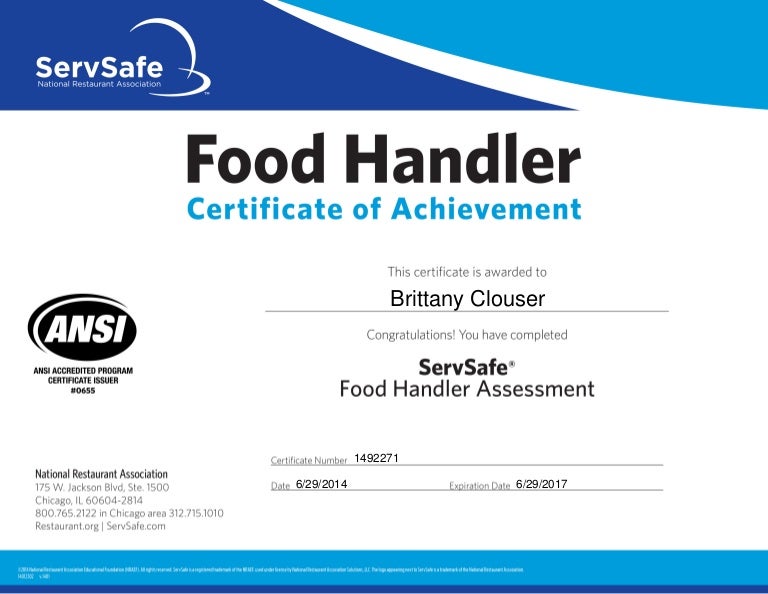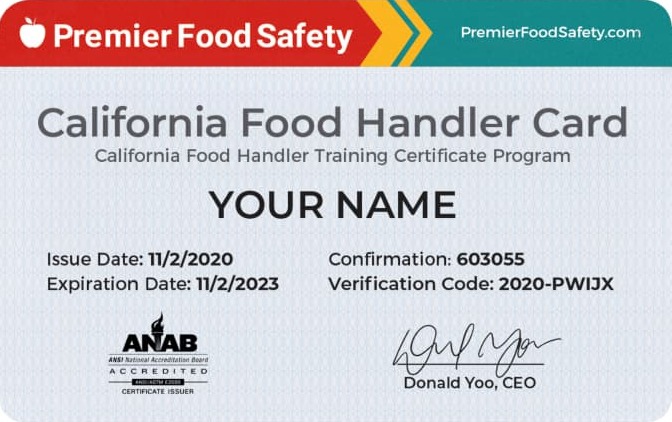The Role of a ServSafe Food Handler Certification in Ensuring Conformity
The Role of a ServSafe Food Handler Certification in Ensuring Conformity
Blog Article
Get Licensed: Master Food Safety With Food Trainer Qualification
The importance of acquiring a Food Handler Accreditation can not be overstated in today's food solution landscape. As the market faces increasing scrutiny concerning food security requirements, recognizing the certification process and its effects becomes crucial.

Importance of Food Safety Certification
Food safety qualification is essential for guaranteeing that food trainers are outfitted with the expertise and abilities needed to preserve high standards of health and security in food prep work and service. This accreditation not just boosts the proficiency of individuals functioning in the food industry however likewise fosters a culture of safety that benefits both consumers and staff members.
By getting food safety and security accreditation, food trainers come to be aware of essential techniques such as proper food storage, cross-contamination avoidance, and individual health requirements. ServSafe Food Handlers Card. This understanding significantly minimizes the risk of foodborne ailments, which can have severe health and wellness implications and effect public trust in food establishments. Qualified food trainers are much better prepared to comply with neighborhood and national policies, thereby lessening the threat of lawful responsibilities and charges for food businesses.
Furthermore, having accredited personnel can enhance a facility's track record, as customers significantly prioritize safety in their dining experiences. Ultimately, food security certification is not just a regulatory requirement; it is a vital financial investment in the total quality and reliability of food service operations, cultivating trust and making sure that security stays a top priority in the sector.

Introduction of Certification Refine
Securing food safety accreditation includes an organized process created to equip food handlers with the required understanding and abilities. This process typically starts with picking a recognized training program, which can be supplied in various styles such as in-person courses, online programs, or crossbreed options. Participants need to select a program that fulfills local regulatory needs and straightens with their learning choices.
As soon as signed up, candidates participate in detailed training that covers vital food security principles and practices - ServSafe Food Handler. This training usually consists of interactive modules, real-world scenarios, and evaluations to enhance understanding. After completing the coursework, participants need to pass a qualification examination that evaluates their understanding of food safety principles
Upon successfully clearing the test, people obtain their food trainer certification, which is normally valid for a specific period, usually ranging from one to three years. It is crucial for certified food handlers to remain upgraded with any kind of adjustments in food safety and security guidelines and methods, requiring periodic revival or proceeding education. This accreditation procedure is vital for making sure that food trainers are educated about secure food handling techniques, consequently minimizing the danger of foodborne diseases and advertising public health and wellness.
Trick Topics Covered in Training
A comprehensive food trainer training program normally covers several key topics important for maintaining food safety and avoiding foodborne ailments. Recognizing the principles of food safety and security is fundamental, including the importance of appropriate hygiene techniques for food handlers. This includes handwashing strategies, proper use handwear covers, and individual tidiness criteria.
One more vital area is the recognition and administration of food threats. Students learn more about organic, chemical, and physical risks, together with his response strategies for preventing cross-contamination. Temperature control is additionally emphasized, as maintaining proper food preparation and storage space temperatures is essential for inhibiting microbial growth.
The training program addresses risk-free food storage space methods, describing just how to correctly identify and arrange food items to make sure quality and safety and security. Furthermore, participants are informed on cleansing and disinfecting procedures for devices and surface areas to eliminate prospective impurities.

Benefits of Obtaining Licensed
Obtaining food handler certification supplies various benefits that prolong beyond individual knowledge and abilities. Most importantly, it boosts an individual's understanding of secure food methods, which is critical in protecting against foodborne illnesses. This understanding not just safeguards the health of consumers yet also promotes a culture of food security within the office.
Additionally, qualification demonstrates a commitment to professionalism and obligation. Companies frequently choose or call for certified workers, acknowledging that qualified people are more probable to stick to safety and security protocols and policies. This can bring about improved workplace efficiency and decreased liability for businesses, as trained personnel are better equipped to deal with food securely.
In addition, getting certification can boost an individual's confidence in their role within the food solution sector. This self-confidence can convert right into far better consumer solution and fulfillment, as staff members that recognize food safety and security are more probable to connect properly about food preparation and handling.
Lastly, many certification programs offer upgraded training and sources, making sure that qualified people remain informed about the most current policies and finest techniques, thus reinforcing their duty as educated specialists in the food security landscape.
Career Opportunities in Food Safety And Security
The foundation of food safety and security knowledge obtained with qualification opens up a selection of profession possibilities within the food market. As food safety and security regulations come to be increasingly rigorous, companies look for certified experts to make sure compliance and keep high standards.
Individuals with food trainer certification can see this website go after duties such as food security inspectors, who examine centers for adherence to health regulations, or food safety and security managers, tasked with creating and implementing safety procedures in food handling plants or restaurants. In addition, roles in quality control and control are readily available, where experts keep an eye on manufacturing procedures to reduce dangers connected with foodborne health problems.
In addition, the expanding fad of food sustainability and organic items has created possibilities for food safety and security consultants who specialize in suggesting companies on best methods. Those with a certification can additionally discover placements in education and learning and training, aiding to enlighten others about safe food handling practices.

Conclusion
Food handler accreditation offers as a crucial component in improving food safety within the food service market. As food security proceeds to be a priority, the qualification opens doors to various profession chances in this necessary field.
By getting food safety accreditation, food handlers come to be familiar with necessary techniques such as proper food storage, cross-contamination avoidance, and personal hygiene requirements.Protecting food security accreditation includes a structured process developed to outfit food trainers with the essential understanding and skills. It is crucial for certified food trainers to stay upgraded with any kind of modifications in food safety and security guidelines and methods, requiring routine renewal or proceeding education.A comprehensive food trainer training program generally covers several vital subjects vital for maintaining food safety and preventing foodborne ailments.Food trainer certification offers as an important component in improving food safety within the food service sector.
Report this page